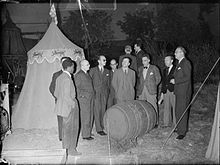Henry V (1944 film)
The film won Olivier an Academy Honorary Award for "his Outstanding achievement as actor, producer and director in bringing Henry V to the screen."
The French, weighed down by their heavy armour, are caught in the fresh mud of the field, and are bogged down, which gives the English troops ample opportunity to ride out and fight them on equal terms.
The French Dauphin, seeing this disadvantage, watches as several bodyguards and noblemen including the Constable of France ride toward the English camp and kill all the boys and squires, prompting a tearful Fluellen to cry that "this is expressly against the law of arms".
Winston Churchill instructed Olivier to fashion the film as morale-boosting propaganda for British troops fighting World War II.
The camera pulls away from the Tower, gleaming white in the sun, and moves past London Bridge (crowded with buildings) to aim across the river at the densely packed city studded with churches, stretching into the distance, until St. Paul's (as it was then) can be seen.
The camera pauses for a beat and then moves back to zoom in on one of the two round theatres, where a man is raising a flag inscribed The Globe Playhouse, showing that a performance is imminent.
The Chorus (a single actor) invokes the audience's imaginations, and when the action in the play moves to Southampton, we enter the world of the Trés Riches Heures of the Duc de Berry, a late medieval Book of Hours.
The Chorus now invokes our imagination to fly past the fleet, barely visible far below in a Channel filled with fog, to the court of France, where Charles VI is attended by various nobles, including the "Duke of Berri", who is examining an illuminated volume with a magnifying glass in one hand and a clove-studded orange pomander in the other.
The Battle of Agincourt takes place in a realistic setting (filmed in Ireland),[7] in natural fields and forests, and dialogue is delivered from the backs of restive chargers.
The next set is a near-perfect rendition of the often-reproduced February page from the Trés Riches Heures, with Pistol taking the place of the man warming himself in the cottage (but with greater modesty).
The Chorus draws the curtain and speaks his epilogue, the camera pans up to the boychoir singing on the balcony and then cuts to the musicians in the gallery above them and moves further up to the narrow porch where a man brings down the flag and takes it inside.
Olivier intentionally left out some of Henry's harsher actions as Shakespeare portrayed them – such as his remorseless beheading of the three Southampton Plot traitors: Richard of Conisburgh, 3rd Earl of Cambridge; Henry Scrope, 3rd Baron Scrope of Masham; and Sir Thomas Grey; his threat to unleash his troops to rape and pillage Harfleur if the city refused to surrender; the cutting of the throats of French prisoners during the battle at Agincourt; as well as his refusal to stop the hanging of his old friend Bardolph for looting.
[8] Olivier agreed not to appear in another film for 18 months to reduce any detraction from the promotion of Henry V. In return, he was paid £15,000, tax-free (about £460,000 in today's money).
He had been badly injured in 1941 while on active service on board HMS Prince of Wales when she was attacked by the Bismarck, and remained totally blind for two years.
[12] The film, which was photographed in three-strip Technicolor, was hailed by critics for its ebulliently colourful sets and costumes, as well as for Olivier's masterful direction and acting.
In 1946, a cagey release strategy in the United States was undoubtedly helped by the "ecstatic" reviews from U.S. critics, "hailing it as one of the screen's first great works of art and the most impressive directing debut since Orson Welles' Citizen Kane (1941).
"[21] Writing in The New Republic, film critic Manny Farber offered this appraisal of Olivier's performance: The picture’s artistic value rests in the perfection of the portrait of a great medieval leader-type, the kind of power-happy, wily statesman who terrifies people today...Olivier sends chills down your back as he smiles at an insult; he makes you uneasy, talking in a charming, bland way of how necessary it is that there be a just reason for conquering France…his transformation during the war into a deeper, greater person is made evident in an almost magical way.
[23] According to Kinematograph Weekly the 'biggest winner' at the box office in 1945 Britain was The Seventh Veil, with "runners up" being (in release order), Madonna of the Seven Moons, Old Acquaintance, Frenchman's Creek, Mrs Parkington, Arsenic and Old Lace, Meet Me in St Louis, A Song to Remember, Since You Went Away, Here Come the Waves, Tonight and Every Night, Hollywood Canteen, They Were Sisters, The Princess and the Pirate, The Adventures of Susan, National Velvet, Mrs Skefflington, I Live in Grosvenor Square, Nob Hill, Perfect Strangers, Valley of Decision, Conflict and Duffy's Tavern.
British "runners up" were They Were Sisters, I Live in Grosvenor Square, Perfect Strangers, Madonna of the Seven Moons, Waterloo Road, Blithe Spirit, The Way to the Stars, I'll Be Your Sweetheart, Dead of Night, Waltz Time and Henry V.[24] Previous efforts to put Shakespeare on the screen included Douglas Fairbanks and Mary Pickford's 1929 The Taming of the Shrew; Max Reinhardt's 1935 A Midsummer Night's Dream for Warner Bros; a British film adaptation of As You Like It starring Olivier and Elisabeth Bergner and scored by William Walton; and MGM's 1936 Romeo and Juliet, directed by George Cukor and starring Norma Shearer and Leslie Howard.
According to TCM.com "After screening Romeo and Juliet (1936), Olivier realized that the standard Hollywood camera style, which included moving in for a close-up at climactic moments, didn't work for Shakespeare.
